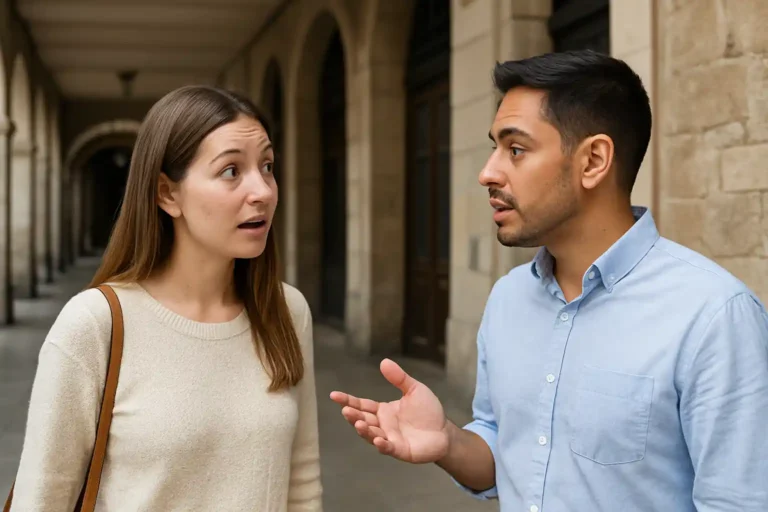Why This Simple Phrase Matters More Than You Think
How to say do you speak English in Spanish is a simple question that can completely transform your travel experience. Whether you’re wandering through a market in Madrid or asking for directions in Mexico City, this phrase often becomes your lifeline.
You might think a translator app is enough—but being able to ask this question out loud creates immediate connection. It opens the door to basic Spanish conversation, builds respect, and often leads to helpful responses even if the person only knows a little English.
Many common Spanish phrases are easy to remember, but this one is arguably the most useful for travelers. And thanks to strong cultural ties between English and Spanish-speaking countries, people are more receptive than you might expect.
✨ Here’s why this phrase is powerful:
⭐ It shows cultural awareness and respect.
⭐ It invites help in a friendly, non-demanding way.
⭐ It breaks the ice without requiring fluency.
According to english to spanish translation studies, people are more likely to respond kindly when you try in their language first. It’s like offering a smile in word form!
Want to compare global English use too? Read Do Most Germans Speak English 5 Facts You Should Know for a peek into how English fits in other countries.
Table of Contents
Phrase 1: ¿Habla inglés? – The Most Direct and Common Way
How to say do you speak English in Spanish doesn’t get more direct than this! “¿Habla inglés?” is the standard, polite way to ask someone if they speak English in a Spanish-speaking country.
This is the go-to question in almost any scenario: hotels, airports, restaurants, or even asking a passerby for help. It’s part of the essential spanish phrases travelers should memorize before their trip.
Here are situations where this phrase works beautifully:
🏨 At hotel receptions when checking in
🍽️ Ordering food at local restaurants
🚍 Asking for directions at a station
It’s also one of the most natural ways of asking English Spanish speakers to switch languages if needed. Since it’s so common among Spanish phrases, locals are likely to understand you right away.
Planning to move abroad? Check out 5 Best Countries to Move to from US that Speak English to explore friendly destinations. And if you want to boost your professional fluency, Master Business English in 2025: Vocabulary, Idioms, and Conversations is a must-read.

Phrase 2: ¿Hablas inglés? – When to Use the Informal Version
How to say do you speak English in Spanish depends on who you’re speaking to. If you’re chatting with someone your age or a friendly local in an informal setting, “¿Hablas inglés?” is a great choice.
This version is a more relaxed way of asking the same question and is commonly used among friends, younger people, or peers. Knowing when to use this version shows you understand a little about Spanish culture too!
In many basic Spanish conversations, this informal form pops up naturally. You might hear it at youth hostels, in casual coffee shops, or among backpackers. It’s also commonly used in english to spanish translation guides for social interaction.
Examples:
☕ Talking to someone at a cafe in Buenos Aires
🎭 Chatting with fellow travelers
🏡 Airbnb hosts or casual meetups
For those looking to improve their fluency, 10 Best Ways How to Improve My English Speaking Skills offers fun and effective techniques.
Phrase 3: ¿Puede hablar inglés conmigo? – A More Polite Request
How to say do you speak English in Spanish isn’t always about being fast—sometimes it’s about being extra polite. That’s when you can say “¿Puede hablar inglés conmigo?” which literally means “Can you speak English with me?”
This version is particularly useful in formal situations or when addressing someone older or in authority. It also comes in handy if you’re unsure about the other person’s English skills and want to be respectful.
This phrase appears frequently in asking English Spanish phrasebooks and common Spanish phrases guides because it combines courtesy with clarity.
Useful in situations like:
💼 Speaking to police officers or officials
🏪 At embassies or hospitals
🏛️ Museums or guided tours
According to english to spanish translation experts, showing respect through formality increases cooperation.
Curious how English fits into academic paths? Read How Many English Classes Are Required in College 5 Things to Know. And if you’re interested in broader context, the english language page is full of global insights.

Phrase 4: ¿Alguien aquí habla inglés? – Asking in a Group Setting
Ever found yourself in a crowd and needing help? “¿Alguien aquí habla inglés?” is how to say do you speak English in Spanish when you’re asking a group.
It literally means “Does anyone here speak English?” and is perfect for busy markets, train platforms, or group tours. This is where your confidence in basic Spanish conversation shines.
You’ll also find this in every top list of spanish phrases travelers should know because it works in diverse settings and doesn’t pressure any one person to respond.
Helpful examples:
🛅 At tour group meetups
🚇 Train stations or airport gates
🏢 City plazas or public squares
It’s also useful when you’re not sure who in the group might help. If you’re still building your confidence, 7 Tips to Easily Speak English in Spanish Conversations can boost your skills in fun ways.
Phrase 5: Lo siento, no hablo español. ¿Habla inglés?
Another helpful option is to express your limits first. Saying “Lo siento, no hablo español. ¿Habla inglés?” means “I’m sorry, I don’t speak Spanish. Do you speak English?”
This phrase is especially useful when you want to be honest about your language skills while still being polite. It blends two important ideas: acknowledging your limitation and asking for help.
It’s one of the best common Spanish phrases to remember, and most locals appreciate your honesty. You’ll see this in many english to spanish translation apps and basic Spanish conversation guides.
Use it when:
🚒 You need medical assistance
🚔 You’re lost or need urgent help
✉️ At post offices or shipping counters
Politeness plus clarity equals better results every time!
Extra Tips: How to Practice and Use These Phrases Naturally
Knowing how to say do you speak English in Spanish is powerful—but using it naturally is even better! Practicing these phrases regularly will help you stay calm and confident when it matters.
Here’s how to get better:
🔊 Practice with language apps like Duolingo or Memrise
🌎 Watch travel vlogs with Spanish subtitles
🧡 Roleplay conversations with friends or tutors
Each of these ideas helps travelers, especially beginners, absorb spanish phrases travelers can use often. You’ll also get more comfortable asking English Spanish questions when needed.
Remember, even a few words can make a big difference. Politeness and effort often open doors quicker than perfect grammar!
Need help practicing or want to learn more? Contact Us and we’ll be happy to guide you on your language journey!
Related Posts

Do People in Turkey Speak English What You Should Know
Do people in Turkey speak English Learn where English is spoken and how easy it is to communicate as a traveler

Can You Speak English How to Ask and Answer Politely
Can you speak English Learn the best ways to ask and respond to this question politely in different travel and social settings

7 Books to Expand Your English Vocabulary Fast
Books to expand vocabulary help you speak and write better Discover top books that make learning new words enjoyable
